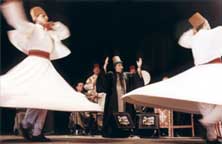


ENSEMBLE AL-KINDI
It sounds impossible, but one of the most highly-respected
ensembles playing Arabic classical music was founded seventeen years ago by
a white European, Julien Jalal Eddine Weiss. French by birth, Weiss was influenced
in his youth by the hippie movement and psychoanalysis, and fell in love with
Arabic music during his twenties. The more he learned about it, the more disappointed
he became with Western music: "At that time I felt that harmony in European
music functioned like a sort of dogma." He broke off his studies of classical
guitar and spent the next several years learning to play the qanun (the Arabic
table zither) with various masters from the Middle East and Northern Africa.
Thanks to his intense longing to penetrate to the very heart of this music,
he practiced for six hours every day over the next two decades, finally becoming
the only respected European performer in the sphere of Arabic sacred music.
He settled in Aleppo, Syria, a city regarded as a bastion of Arabic culture,
where he lives in a magnificent 14th century house with a large cupola, a
marble fountain and a traditional "iwan", or music room. It was here, during
the time between the evening and morning calls to prayer, that he and his
Ensemble Al-Kindi recorded their latest album, "The Aleppo Music Room".
Besides the qanun, the ensemble consists of ney (reed flute), ud (Arabic lute) and percussion, all played by consummate masters of these instruments. A true highlight of the performance is the voice of Sheikh Hamza Shakkur, one of the greatest living interpreters of devotional songs from the mystical Sufi tradition. The music of Al-Kindi summons listeners to the most diverse levels of contemplation. Some of its lines lead to awesome depths, others soar to the skies. You can immerse yourself in this splendid music for hours without perceiving time at all.
The dancing (or whirling) dervishes of Damascus, in their flowing white skirts, spinning in one place as if on some invisible axis, further heighten this sublime experience.